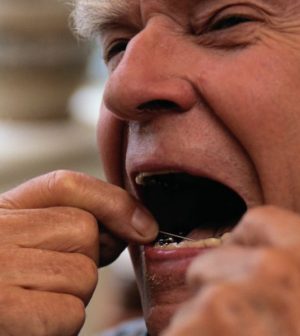- Could Your Grocery Store Meat Be Causing Recurring UTIs?
- Are You Making This Expensive Thermostat Error This Winter?
- Recognizing the Signs of Hypothyroidism
- 10 Strategies to Overcome Insomnia
- Could Artificial Sweeteners Be Aging the Brain Faster?
- Techniques for Soothing Your Nervous System
- Does the Water in Your House Smell Funny? Here’s Why
- Can a Daily Dose of Apple Cider Vinegar Actually Aid Weight Loss?
- 6 Health Beverages That Can Actually Spike Your Blood Sugar
- Treatment Options for Social Anxiety Disorder
Could Unhealthy Gums Worsen COPD?

New research in mice is pointing to a surprising connection: Gum disease could exacerbate chronic obstructive pulmonary disease (COPD).
Because gum disease (periodontitis) is a chronic, inflammatory infection, it’s long been linked to higher heart disease risks. Now, Chinese researchers believe it could also have ties to the sixth leading cause of death in the United States, COPD.
“We’ll further carry out additional studies on human subjects to confirm the mechanism,” said study co-lead author Yan Li, of the West China Hospital of Stomatology at Sichuan University.
“Our finding could lead to a potential new strategy for treating COPD,” Li said in a news release from the American Society for Microbiology.
COPD is a progressive, inflammatory lung condition that’s often (but not always) linked to smoking. There is no cure for the illness, which over time makes breathing more difficult.
In prior research, Li and co-lead author Boyu Tang (also of Sichuan University) helped confirm that a bacteria often found in the mouth, Porphyromonas gingivalis, is a major contributor to gum disease.
Because gum disease and COPD are both inflammatory conditions, the Chinese researchers investigated possible links using a mouse model.
In one set of experiments, they found that mice infected with gum disease and COPD had faster progression of COPD than if they only had COPD.
In another experiment, the team tracked the spread of P. gingivalis throughout the rodents’ bodies. They found the bacterium moved from the mouth to COPD-affected lung tissue, where it upset the natural colonies of microbes in the lungs.
Gum disease also appeared to promote the proliferation of certain immune system cells within lung tissue in mice, and it appeared to activate these immune cells, exacerbating processes linked to COPD.
By treating gum disease and therefore dampening its effect on immune cells in the lungs, doctors “may be able to help control the progression of COPD,” Tang theorized.
Of course, findings from animal studies often do not pan out in humans, so Li and Tang plan studies in people to help confirm these results.
They will recruit patients who are battling both gum disease and COPD, offer them treatment to ease gum disease severity, and then see if patients’ lung function improves.
The findings were published Jan. 12 in the journal mSystems.
More information
Find out more about gum disease at the Cleveland Clinic.
SOURCE: American Society for Microbiology, news release, Jan. 12, 2024
Source: HealthDay
Copyright © 2026 HealthDay. All rights reserved.










